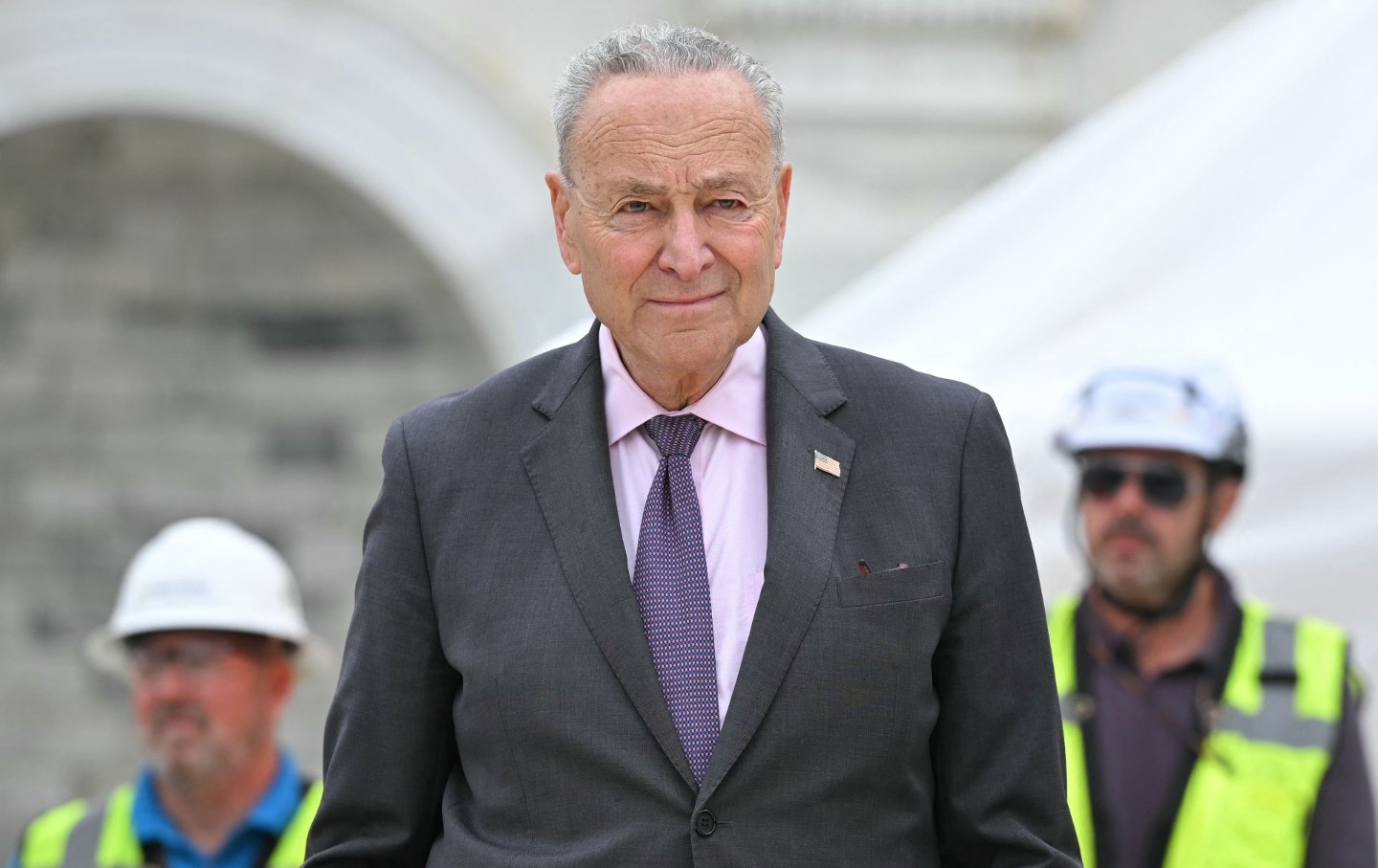Democrats Are Letting a Vital Chance to Protect Workers Slip Away
The Senate has yet to reconfirm the chair of the National Labor Relations Board—a crucial bulwark against the oncoming Trump onslaught.

Senate majority leader Chuck Schumer (D-NY) participates in an event on September 18, 2024, on the lower west terrace of the US Capitol in Washington, DC, to hammer the first nails into the platform that will be built for the presidential inauguration.
(Mandel Ngan / AFP via Getty Images)For all the agita now seizing Democrats over their vanishing appeal to working-class voters, there’s an imminent test of the party’s ability to deliver a significant victory for American workers: a vote to reconfirm National Labor Relations Board chair Lauren McFarren. In August, the Senate Health, Education, Labor, and Pensions Committee, chaired by Bernie Sanders, voted to move McFarren’s confirmation to a full floor vote, but her nomination has languished since then. Now, with Republicans set to take control of the Senate in January, there’s no time to waste in getting McFarren over the line.
The NLRB has been instrumental in protecting and expanding workers’ rights during the Biden administration. It’s issued rulings that punish employers for retaliating against workplace organizing drives, reversed a series of anti-worker Trump administration directives, and secured basic collective bargaining rights for on-site workers as well as independent contractors. Much of this record is thanks to the aggressive work of NLRB Lead Counsel Jennifer Abruzzo, but McFarren has also played a critical role in reviving the agency’s original mission as a first-line defender of collective bargaining rights in the workplace.
It’s already an indictment of the Democrats’ haphazard attention to fundamental workers’ rights that McFarren’s confirmation has dragged on to the end of the 118th Congress—yet this neglect is part of a regrettable larger pattern. It was only after a protracted lobbying effort that the agency won a nominal budget increase in the 2023 omnibus appropriations bill, well shy of the 10 percent hike it had requested, and woefully short of what’s needed for NLRB officials to keep pace with a burgeoning workload and staffing shortages. And even this modest outlay was the agency’s first budget increase since 2014. Meanwhile, Virginia Foxx (R-NC), Sanders’s House counterpart, staged cynical hearings to target the NLRB’s support for workers’ rights as an arm of partisan Democratic electoral efforts; the panel’s efforts went nowhere legislatively, but tied up more of the agency’s scarce resources in the bid to defend its autonomy and legitimacy.
The NLRB’s track record under Biden has also spawned militant private-sector pushback. Starbucks, Trader Joe’s, SpaceX, and Amazon—all companies seeking to rescind or forestall organizing drives among their workforces—have filed a lawsuit challenging the constitutionality of the agency. Right-wing legal advocacy groups such as the Federalist Society have also begun circling around the agency’s Cemex ruling, which held that employers found to have engaged in unfair labor practices prior to a union election are bound to recognize and bargain with the union.
Because the Senate has been dragging its heels on McFarren’s confirmation, there’s a nontrivial chance that it will be left to die on the vine, particularly as other key posts, such as Biden’s 41 remaining nominees to the federal judiciary, are also waiting to be filled. That’s a potential miscalculation that would badly derail the cause of workers’ rights—to say nothing of the damaged electoral brand of the Democratic Party. “While there are many important outstanding nominations that require the Senate’s attention, none is more important substantively or symbolically than that of McFerran,” says Jeff Hauser, head of the federal watchdog group the Revolving Door Project. “Senate majority leader Chuck Schumer and his caucus will go down in ignominy if they prioritize a relaxed turkey dinner on Thanksgiving or extend Christmas at some posh resort over the direction of the NLRB. I personally think [Teamsters Union president] Sean O’Brien was wrong about the two political parties—but it would be a tremendous mistake by Schumer to try to make his analysis look sort of on point.”
The peril that awaits the labor movement if Democrats don’t get their act together is clear. The second Trump administration will be far more disciplined in dismantling workers’ rights than it was the first time out. Elon Musk, the fiercely anti-union head of Tesla, SpaceX, and Twitter, has set himself up as a de facto copresident-elect after generously bankrolling Trump’s 2024 campaign. Should Trump proceed with his campaign promise to anoint Musk as his “efficiency czar” to target ostensible nonessential government spending, look for the NLRB to be starved once more of basic funding. And needless to say, the multifront legal challenge to dismantle the agency and its operational authority would likely find a sympathetic hearing from a right-wing Supreme Court that’s already compiled a brutal litany of anti-worker rulings. Keeping McFarren in her post through October 2026 at least permits the beleaguered NLRB to continue functioning as a critical beachhead for employees’ rights—particularly as Trump turns virtually all other arms of the administrative state against them.
Rallying to bolster the NLRB would also send an urgent signal to the American public that Democrats have got the message from the disastrous outcome of the 2024 election—that rather than seeking to dismiss and downplay the struggles of Americans battling for their livelihoods, the party of the New Deal is prepared to fight for them, long and hard. The alternative scenario would be the worst possible gloss on the election’s fallout. Hauser says, “It’s malpractice that Schumer’s investment in long recesses has led us to the point in which the leadership, and thus the mission, of the NLRB is so threatened.”








